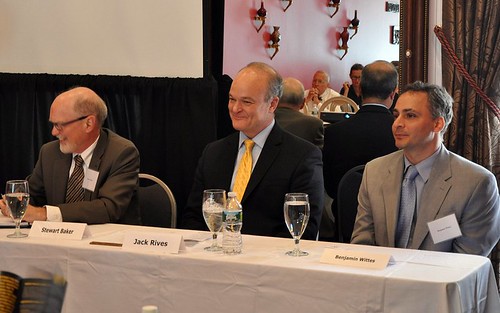The potential for cyber attack in the United States is understated and the increasing vulnerability is shared not only by the private sector but also by the military and other government operations.
While the Obama administration has treated the cyber threat more seriously than either the Bush or Clinton administrations, Stewart Baker, a former assistant secretary for policy in the Department of Homeland Security told the 2011 Medill National Security Journalism conference, serious legal issues are still unresolved.
Among those policy issues are making U.S. cyber defense consistent with the Fourth Amendment; resolution of a basic “turf war” between the CIA, Homeland Security and the Department of Defense; determining what authority to invoke in defending the private sector and how to apply the laws of war or, in other words, how to respond with proportionality when attacked in cyberspace.
Baker was one of three guests on the National Security Law panel that also focused on the role of military commissions, America’s overall detention policy and what one panelist described as the media’s misdirected attention to that policy.
Benjamin Wittes, a senior fellow at the Brookings Institution and a former editorial writer for The Washington Post, said the media is failing to cover how the most basic laws surrounding detention are being written in cases before the D.C. Circuit Court of Appeals in Washington.
Instead of focusing on the actual development of law, he said, the vast majority of the media that is even interested in detention issues is “obsessively” covering the Guantanamo detention issue, which is declared “profoundly unimportant” compared to larger questions surrounding American detention policy.
The question of whether the U.S. should be engaged in noncriminal detention of terrorism suspects is both complicated and creates mixed opinions, he noted, but the reality at this time is all three branches of government and both major political parties agree that it is necessary.
He also dismissed the question of whether defendants should be tried by military commissions as important but with only a handful of prisoners at Guantanamo Bay it is only a small corner of a policy that has touched tens of thousands of detainees in Afghanistan and Iraq.
Wittes said press coverage of who can be detained and who gets what due process is minimal and rarely looks at the rules being written at this moment in the D.C. courts.
Panelist Jack Rives, executive director of the American Bar Association and formerly the Air Force’s top judge advocate general, explained how military commissions work and said they are necessary considering the four descriptive words that describe the defendants: “alien, unprivileged, enemy belligerents.”
Rives said the commissions are unlike many other judicial systems such as courts martial or the international criminal courts. There are many similarities to U.S. civilian courts, however, including the presumption of innocence, the right to be present at trial and to see evidence presented against them.
Statements obtained by torture are not allowed, he added, and defendants have the right to appeal a decision.
Among the differences are more relaxed hearsay rules and judges can determine if they believe prosecution statements are reliable. One large, underlying issue is whether information primarily gathered for intelligence interests can later be used as evidence in the judicial proceeding.
The military commissions are a fair legal process and not a kangaroo court, Rives declared, paraphrasing former celebrity lawyer F. Lee Bailey who said if he was ever charged with a crime and was innocent, he would want to have a military trial.
[field name=”related”]






